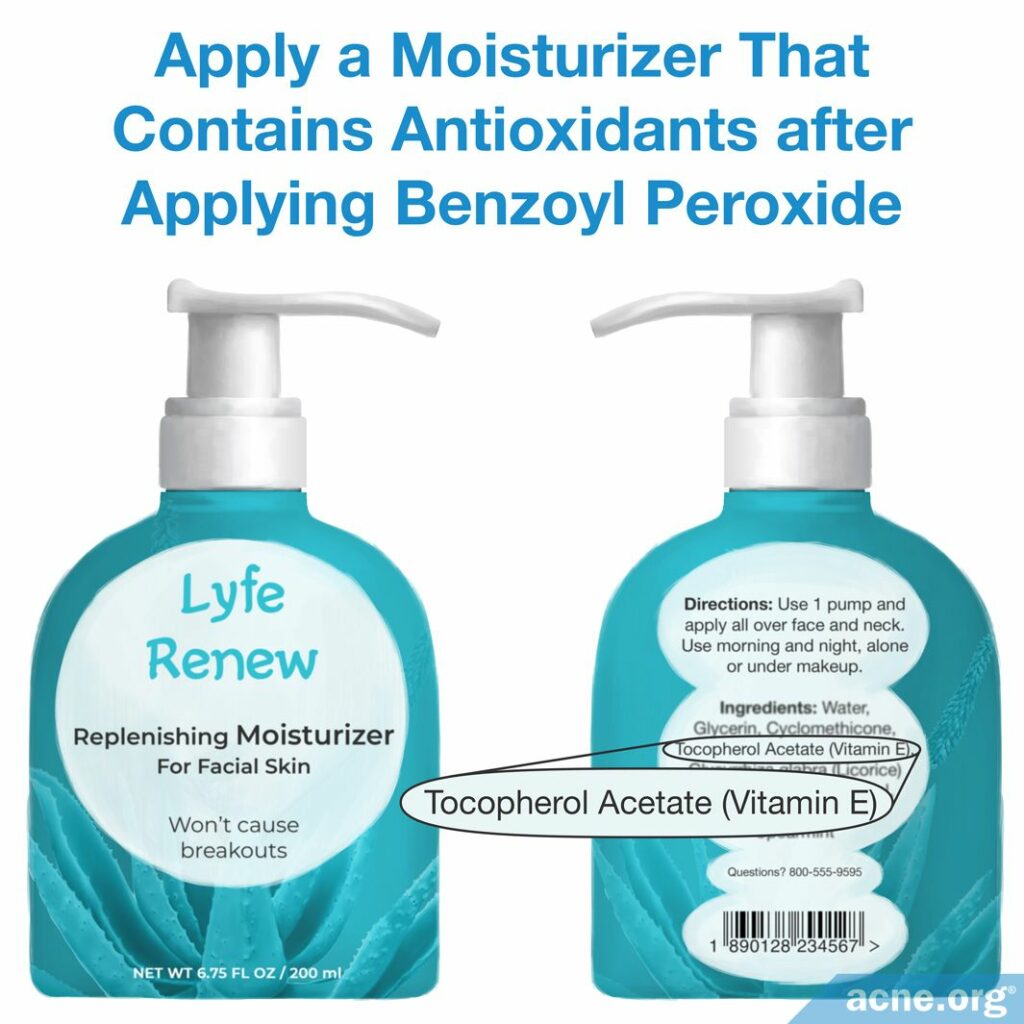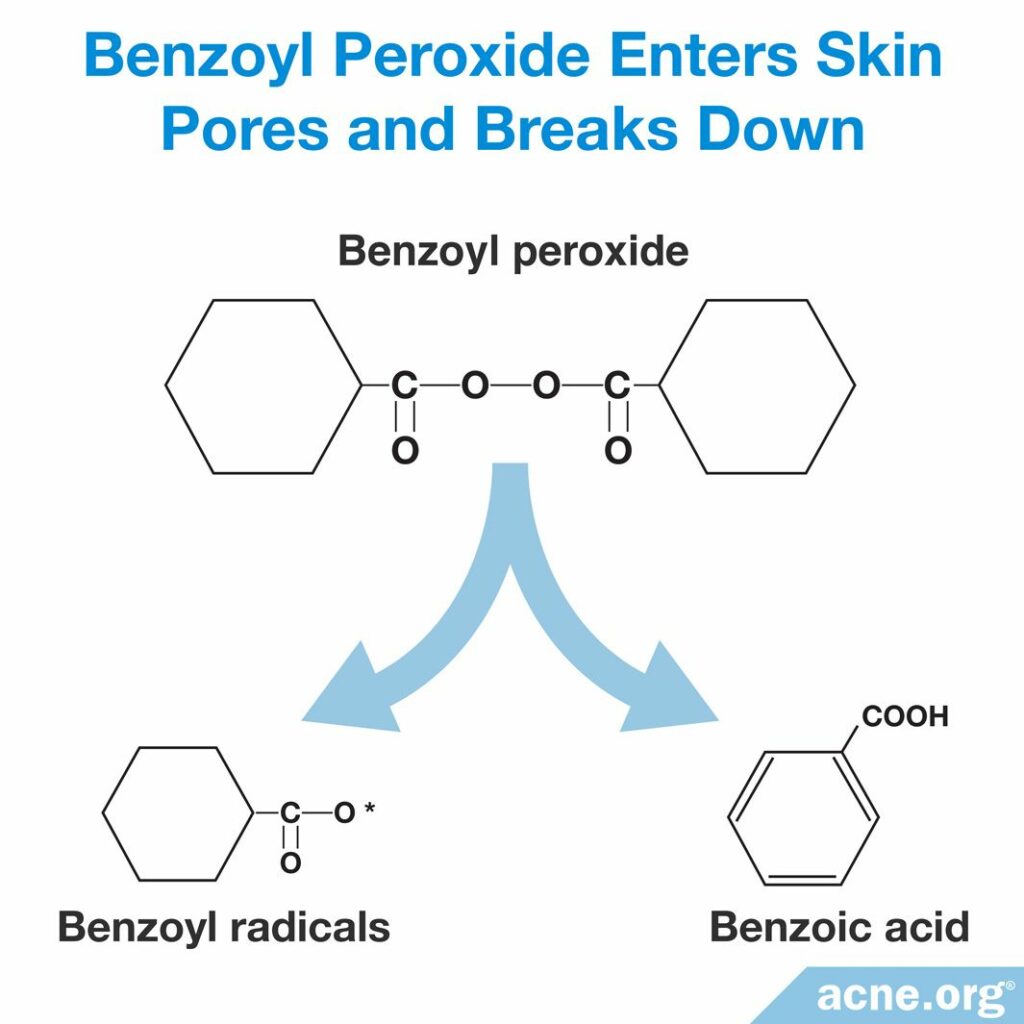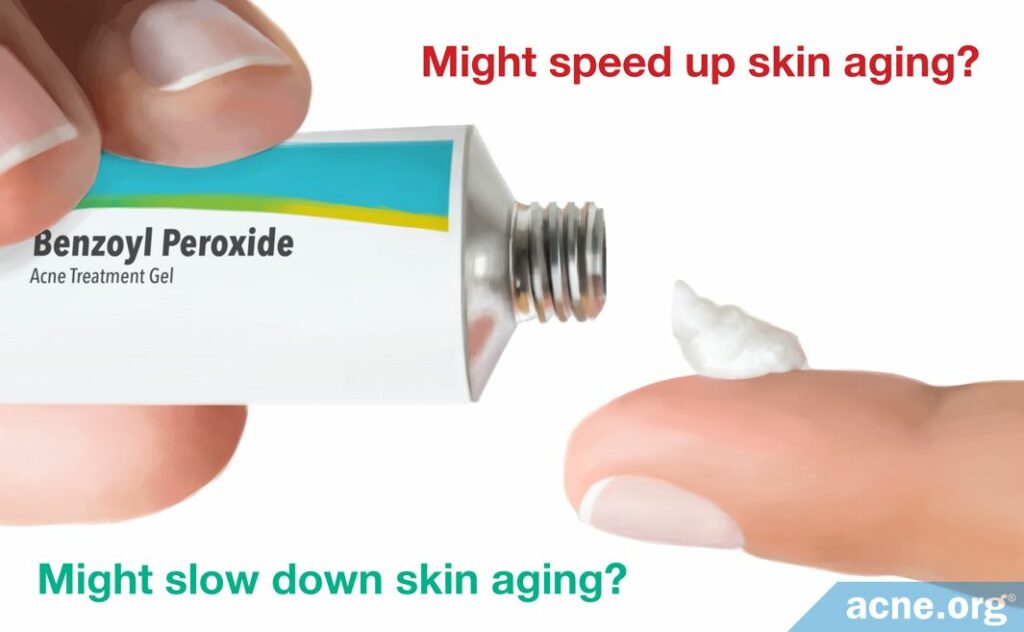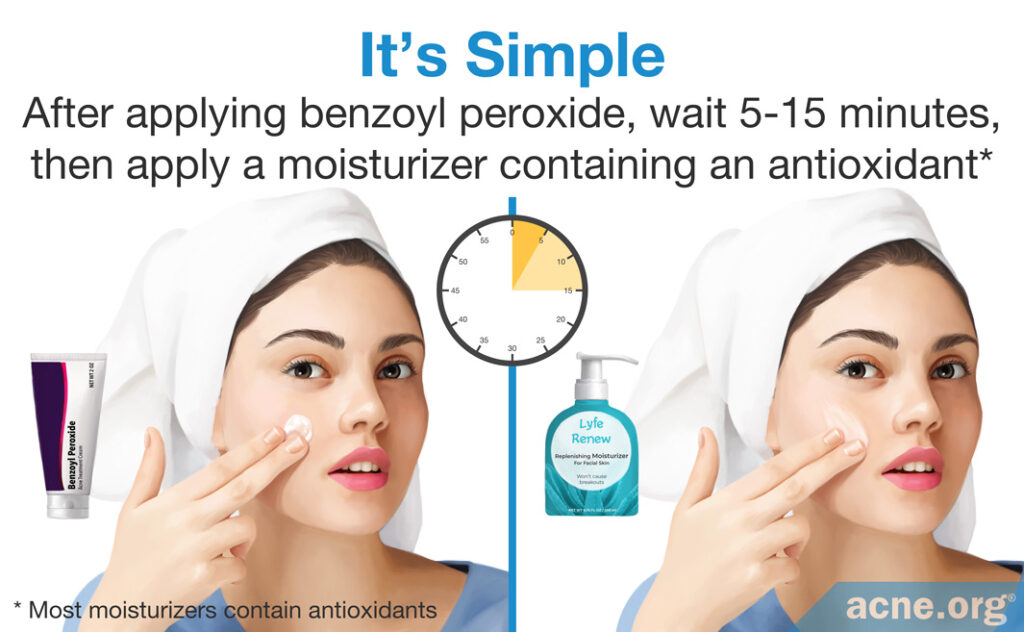Views: 5
It May or May Not. To Be Extra Safe, Apply an Antioxidant-containing Moisturizer to Your Skin after Treating the Skin with Benzoyl Peroxide.

The Essential Info
Benzoyl peroxide effectively treats acne, and can completely clear the skin when used properly.
However, one question some people have is whether using benzoyl peroxide affects skin aging. There is no scientific evidence that benzoyl peroxide causes the skin to age more quickly, and there is some evidence that it may actually prevent aging due to its ability to reduce inflammation.
However, when benzoyl peroxide absorbs into the skin it releases benzoyl radicals, which are a type of free radical. The skin naturally creates free radicals on an ongoing basis, but too many free radicals might contribute to skin aging.
To be on the safe side, apply a moisturizer containing an antioxidant such as vitamin E, C, or licochalcone to the skin after treating it with benzoyl peroxide. This should effectively neutralize any extra free radicals that are produced.
Most Moisturizers Contain Antioxidants: Almost every over-the-counter facial moisturizer contains an antioxidant because including an antioxidant in the formula is important for keeping other ingredients fresh. So, don’t stress out too much about whether your moisturizer contains an antioxidant. Some products contain more potent antioxidants than others, but almost every moisturizer will contain one.
My Personal Experience: I have used benzoyl peroxide for many years. The skin where I have applied it looks younger and less inflamed than the skin where I have not. This is anecdotal since I am only one person, but in my experience, if I had to say whether benzoyl peroxide led to more or less skin aging, I’d have to say less.

The Science
- What Is Benzoyl Peroxide?
- Does It Speed Up or Slow Down Skin Aging?
- Apply an Antioxidant-containing Moisturizer After Treating With Benzoyl Peroxide
Benzoyl peroxide is a popular topical treatment for acne due its high efficacy, lack of serious side effects, and affordability. It works exceptionally well when applied correctly, and doctors often prescribe it alongside other treatments like retinoids or antibiotics because it can help other treatments work better. However, a potential concern for users is that benzoyl peroxide might accelerate skin aging.
While there is currently no scientific evidence that this occurs, part of how benzoyl peroxide treats acne is by generating free radicals, called “benzoyl radicals,” that kill acne bacteria. However, free radicals are substances that may contribute to skin aging. In addition, benzoyl peroxide often causes temporary skin dryness, which may accentuate fine lines and further create an impression of premature aging.

Fortunately, these side effects are easy to counteract by applying a moisturizer that contains antioxidants to the skin after benzoyl peroxide treatment. Antioxidants neutralize benzoyl radicals created by benzoyl peroxide, and the hydrating ingredients in a moisturizer will prevent dryness.
What Is Benzoyl Peroxide?
Benzoyl peroxide is available both over-the-counter in 2.5% to 10% strength and is an extremely effective weapon in the fight against acne when used in sufficient quantities, and particularly when combined with an alpha hydroxy acid like glycolic acid.
When benzoyl peroxide enters the skin, it breaks down into 2 compounds:
1. Benzoyl radicals: These are a type of free radical that efficiently kills acne bacteria, and may help reduce inflammation.
2. Benzoic acid: Benzoic acid is thought to cause mild skin peeling that helps to unclog skin pores.1-3

Benzoyl Peroxide – Does It Speed Up or Slow Down Skin Aging?

How benzoyl peroxide might speed up skin aging
A benzoyl radical is a type of free radical. You may have heard of free radicals as substances that can be harmful to human health. This can be true. Free radicals react easily with proteins, lipids, and DNA in human cells. These reactions can result in damage to healthy tissue, known as oxidative damage, which can play a role in skin aging.3-6
On the other hand, benzoyl peroxide might also slow down skin aging. Let’s take a look at how this might occur:
How benzoyl peroxide might slow down skin aging
Research suggests that benzoyl radicals kill not only acne bacteria but also inflammatory cells that naturally exist in our skin.1,2 Research indicates that chronic (long-lasting) inflammation is one of the main underlying causes of skin aging. Therefore, by reducing the action of inflammatory cells, benzoyl radicals from benzoyl peroxide may actually slow down skin aging.7
Since most of the research on this topic comes from studies in vitro (conducted in a test tube or petri dish) rather than from studies on patients, we can only speculate on how benzoyl peroxide might be involved in skin aging. It is possible that overall, benzoyl peroxide might speed up skin aging, slow down aging, or have no observable effect on skin aging at all.
Still, to be on the safe side, to counteract any potential negative effects of free radicals, after applying benzoyl peroxide, apply a moisturizer that contains an antioxidant, which will neutralize free radicals.
Apply an Antioxidant-containing Moisturizer After Treating With Benzoyl Peroxide

Antioxidants naturally occur in the skin and help the body neutralize free radicals. Two of the most common antioxidants in the skin are:
- Vitamin E
- Vitamin C
Research shows that when we apply benzoyl peroxide to the skin, the skin’s vitamin E reserves may become depleted by 90% and its vitamin C reserves by 65%.6,8-10 Once these antioxidants are depleted, the skin is less able to protect itself against oxidative damage. This is why it is a good idea to apply a moisturizer that contains antioxidants like vitamin E or C to replenish what was lost and keep the skin able to neutralize any leftover benzoyl radicals after they have done their job. Some other antioxidants include licochalcone, resveratrol, and spearmint.
Research suggests that applying the following antioxidants to the skin may preempt skin aging caused by oxidative damage
- Vitamin E: Vitamin E is the skin’s main antioxidant defense mechanism. Therefore, it makes sense that applying vitamin E to the skin can help prevent oxidative damage from benzoyl peroxide.

Research suggests that topical vitamin E application decreases side effects from benzoyl peroxide treatment and may even improve the efficacy of the treatment. According to a 2016 article in the Journal of Clinical and Aesthetic Dermatology, “Previous studies have indicated that the presence of vitamin E…enhances the efficacy and tolerability of topical [benzoyl peroxide].”11
- Resveratrol: Resveratrol is another powerful antioxidant, and studies have demonstrated that topical resveratrol can protect the skin from sun damage and oxidative damage. Research shows that resveratrol may improve skin elasticity, which is a feature of youthful skin, thus making resveratrol a promising compound for preventing skin aging that might possible result from benzoyl peroxide.4
- Spearmint: Researchers have tested spearmint specifically for its ability to reduce oxidative damage caused by benzoyl peroxide and found it to be highly effective:

The study used mice and was published in the journal Food and Chemical Toxicology in 2000. In the study, the researchers applied benzoyl peroxide to the skin of some mice and measured the resulting oxidative damage. To test whether spearmint can protect the skin from oxidative damage, the researchers treated the skin of another group of mice with different concentrations of spearmint before applying benzoyl peroxide, and again measured oxidative damage. They found that oxidative damage in the skin of mice treated with spearmint was reduced compared to mice who only received benzoyl peroxide. This effect was dose-dependent, meaning that more spearmint resulted in less oxidative damage.12 These findings suggest that spearmint is an effective protective agent that may prevent skin aging caused by benzoyl peroxide.
In closing, benzoyl peroxide is an effective and affordable topical acne treatment. There is no research evidence that benzoyl peroxide accelerates skin aging, but to be on the safe side, this concern can be eliminated by applying a topical moisturizer containing antioxidants in conjunction with benzoyl peroxide treatment.

A 2018 study in the Journal of Dermatological Treatment found that adding daily application of a moisturizer to acne patients’ benzoyl peroxide treatment plan improved patient satisfaction and allowed patients to stick to their treatment plan longer.13
References
- Tucker, R. & Walton, S. The role of benzoyl peroxide in the new treatment paradigm for acne. Pharm. J. 279, 48 – 53 (2007). https://www.ncbi.nlm.nih.gov/pubmed/23839205
- Sagransky, M., Yentzer, B. A. & Feldman, S. R. Benzoyl peroxide: a review of its current use in the treatment of acne vulgaris. Expert Opin. Pharmacother. 10, 2555 – 2562 (2009). https://www.ncbi.nlm.nih.gov/pubmed/19761357
- Mohammad, T. F. Acne therapeutics: A closer look at Benzoyl Peroxide. Skinmed 13, 94 – 96 (2015). https://www.ncbi.nlm.nih.gov/pubmed/26137733
- Silva, S. A. M., Leonardi, G. R. & Michniak-Kohn, B. An overview about oxidation in clinical practice of skin aging. An. Bras. Dermatol. 92, 367 – 374 (2017). https://www.ncbi.nlm.nih.gov/pmc/articles/PMC5514578/
- Ibbotson, S. H., Moran, M. N., Nash, J. F. & Kochevar, I. E. The effects of radicals compared with UVB as initiating species for the induction of chronic cutaneous photodamage. J. Invest. Dermatol. 112, 933 – 938 (1999). https://www.ncbi.nlm.nih.gov/pubmed/10383741
- Valacchi, G., Rimbach, G., Saliou, C., Weber, S. U. & Packer, L. Effect of benzoyl peroxide on antioxidant status, NF-kappaB activity and interleukin-1alpha gene expression in human keratinocytes. Toxicology 165, 225-234 (2001). https://pubmed.ncbi.nlm.nih.gov/11522381/
- Pillai, S., Oresajo, C. & Hayward, J. Ultraviolet radiation and skin aging: roles of reactive oxygen species, inflammation and protease activation, and strategies for prevention of inflammation induced matrix degradation–a review. Int. J. Cosmet. Sci. 27, 17 – 34 (2005). https://www.ncbi.nlm.nih.gov/pubmed/18492178
- Thiele, J. J. Oxidative targets in the stratum corneum. A new basis for antioxidative strategies. Skin Pharmacol. Appl. Skin Physiol. 14 Suppl 1, 87 – 91 (2001). https://www.ncbi.nlm.nih.gov/pubmed/11509912
- Thiele, J. J., Schroeter, C., Hsieh, S. N., Podda, M. & Packer, L. The antioxidant network of the stratum corneum. Curr. Probl. Dermatol. 29, 26 – 42 (2001). https://www.ncbi.nlm.nih.gov/pubmed/11225199
- Brammann, C. & Müller-Goymann, C. C. An update on formulation strategies of benzoyl peroxide in efficient acne therapy with special focus on minimizing undesired effects. Int. J. Pharm. 578, 119074 (2020). https://pubmed.ncbi.nlm.nih.gov/31982561/
- Mills, O. H., Criscito, M. C., Schlesinger, T. E., Verdicchio, R. & Szoke, E. Addressing free radical oxidation in acne vulgaris. J. Clin. Aesthet. Dermatol. 9, 25 – 30 (2016). https://www.ncbi.nlm.nih.gov/pubmed/26962389
- Saleem, M., Alam, A. & Sultana, S. Attenuation of benzoyl peroxide-mediated cutaneous oxidative stress and hyperproliferative response by the prophylactic treatment of mice with spearmint (Mentha spicata). Food Chem. Toxicol. 38, 939 – 948 (2000). https://www.ncbi.nlm.nih.gov/pubmed/11039327
- Kim, M. R. & Kerrouche, N.. Combination of benzoyl peroxide 5% gel with liquid cleanser and moisturizer SPF 30 in acne treatment results in high levels of subject satisfaction, good adherence and favorable tolerability. J. Dermatolog. Treat. 29, 49-54 (2018). https://www.ncbi.nlm.nih.gov/pubmed/28678647
The post Does Benzoyl Peroxide Cause the Skin to Age Faster? appeared first on Acne.org.









